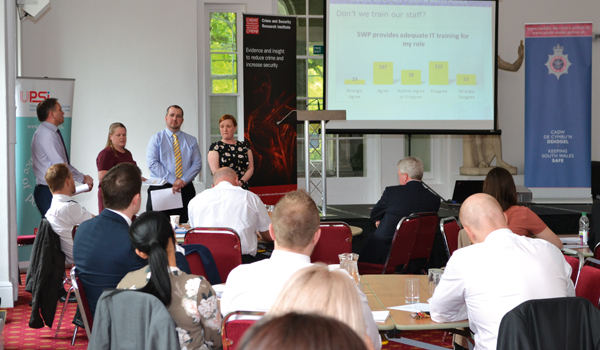Shaping futures
All too often research is conducted in isolation, but South Wales Police explains how it has implemented a novel way of developing knowledge by sharing ideas.
All too often research is conducted in isolation, but South Wales Police explains how it has implemented a novel way of developing knowledge by sharing ideas. Over the past decade, UK policing has grappled with a series of profound changes, including fundamental reform to its governance, major reductions in funding, shifts in the profile of demand and the social impacts of new technologies. Throughout this period, South Wales Police has partnered with the Universities Police Science Institute (UPSI) at Cardiff University to design and test a number of innovative responses to these challenges, pivoting around the idea that blending academic expertise and practitioner experience is the best way to conduct research to improve public protection, crime prevention and detection, and victim support. Informed by learning from this decade of collaboration, South Wales Police has recently stepped up its investment in this approach to service improvement. The Policing Futures programme is providing the knowledge, skills and experience required to develop critical thinking and evidence-based practice among the predicted future leaders within the force. It is a re-boot in approach, which is about using individuals from across the workforce to tackle the problems that really matter. A critical success factor has been the emphasis placed on both problem-finding and problem-solving. Too often police organisations want to rush into solution mode without necessarily understanding the contours and configuration of what they are confronting. As Albert Einstein is alleged to have said, if I have an hour to solve a problem, then I will spend 55 minutes trying to understand it, and five minutes to solve it. Indeed, the academic support team plays an important role in structuring the problem finding activity, and helping police participants understand how different research methods and techniques can take a problem apart providing insights into how and why it presents in particular ways. After that, the SWP practitioners take ownership for conducting robust and rigorous research to test the solutions they have designed. The first programme completed last year and a second cohort of officers and staff recently launched their six-month projects. On both occasions, a key dynamic has been that it is not one or two isolated projects on specific issues that are being undertaken, but rather a full programme of research, ranging across multiple aspects of the contemporary policing mission. Recent topics researched have included BAME (black, Asian and minority ethnic) victim satisfaction, the relationship between police and mental health services, child sexual exploitation, the use of technology in policing and career development for police community support officers. This is all about improving the performance of South Wales Police in terms of delivering a quality service to victims of crime, improving the way we tackle vulnerability and meeting the challenges of implementing new technology, said Chief Constable Matt Jukes. The programme benefits those who take part by developing their leadership and decision-making skills as well as benefiting the organisation by using the collective ideas and creativity of the people who work here. Im really excited that this project is now in its second phase and we are seeing some real outcomes from the first programme. Participants self-organise into project groups, each of which is allocated an academic mentor from UPSI to advise on study design, methodology and analysis, together with a senior force shepherd to provide internal governance, operational input and to aid the data access and generation process. The groups conduct their research in their own time, meeting regularly over the six-month period with both mentor and shepherd for input and guidance and presenting their progress at appropriate force governance boards. A series of masterclasses spread across the programme provide opportunities for participants to hear from external speaker


